
(Guest Post by Ed Gillis – a travel essay about our families’ 2012 Yukon River paddling adventure)
Not an hour after we narrowly escaped some rapids that nearly thrust us into a thirty-foot clay cliff, a call comes from the lead canoe: “We camp right over there!” Now hugging the left bank of the mighty Yukon River, water flowing smooth and fast, we see the clearing on the right bank – straight across, a football field away.
It’s our first river paddling expedition, and our first time together in one canoe this week without our more experienced hosts at the helm. We rehearse the steps for a cross-river manoeuvre under our breath: pivot canoe against the current, slightly angle to the desired shore, paddle madly. We execute mostly the paddling madly.
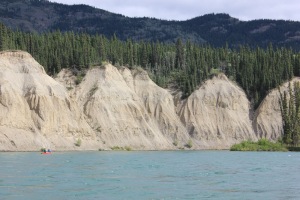 Halfway to shore, we’ve already gone fifty metres downstream. Now we’re both trying to steer, while frantically barking useless commands at each other.
Halfway to shore, we’ve already gone fifty metres downstream. Now we’re both trying to steer, while frantically barking useless commands at each other.
Then, from the middle of our canoe comes a sound that restores our spirits as we float ever farther downstream.
“Looks like you guys need help!” shouts our four-year-old son as he thrusts his pint-sized paddle, attached by a cord to his lifejacket, into the rushing river.
“Guys need help!” parrots his two-year-old brother as he begins paddling on the other side, backwards.
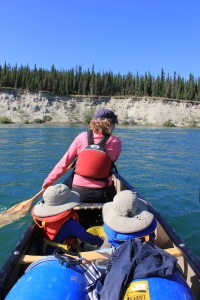 The four of us eventually made it to shore that July afternoon, joining our hosts Auntie Brook and Uncle Malcolm – two transplanted “southerners” who’ve become lifers in the great Canadian North. We promptly realized that our intended campsite was actually back on the left bank, and we made the return cross-river voyage having re-arranged the paddling teams before finally celebrating another successful day on our family wilderness adventure.
The four of us eventually made it to shore that July afternoon, joining our hosts Auntie Brook and Uncle Malcolm – two transplanted “southerners” who’ve become lifers in the great Canadian North. We promptly realized that our intended campsite was actually back on the left bank, and we made the return cross-river voyage having re-arranged the paddling teams before finally celebrating another successful day on our family wilderness adventure.
We’ve lost count of the number of couples who’ve said they’re nervous about having kids because they don’t want to stop doing what they want to do. But since our oldest son Heron was born in 2008, we’ve hiked the Camino de Santiago across Europe during the first signs of teething; trekked along the Andean ridge in Patagonia while introducing solid foods, and explored volcanic craters in Maui with two napping boys on our backs.
But a week-long canoe trip from Whitehorse to Carmacks – the first leg to Dawson City along the great gold rush route – was a big leap for us. Our destination was over 240 kilometres away, and the river was our only route. There was no escape hatch if the boys decided they didn’t like canoeing or pooping in an improvised hole; no way to shuttle ahead to civilization if our gear or clothes got soaked. This was our first family expedition with a satellite phone and medevac insurance.
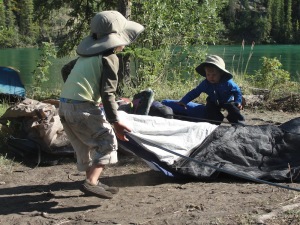 It’s a wilderness untouched but well worn. Each night we camped within feet of the river at a site not especially created or maintained, but visited enough to have a workable tent clearing, a fire pit, and occasionally even a picnic table. We didn’t hear a motor of any kind for six days – the only other signs of humanity were the rusty metal and rotting timber of a bygone era, and our fellow modern-day voyageurs.
It’s a wilderness untouched but well worn. Each night we camped within feet of the river at a site not especially created or maintained, but visited enough to have a workable tent clearing, a fire pit, and occasionally even a picnic table. We didn’t hear a motor of any kind for six days – the only other signs of humanity were the rusty metal and rotting timber of a bygone era, and our fellow modern-day voyageurs.
At each day’s end, we hiked 150 metres upstream and floated on our backs back to camp, the boundless blue sky whisking by above, waiting for our sons to shout “Mommy! Daddy! You’re here! Time to stop!” from the shore. We often went 30 metres more before our feet gripped firmly enough to heed their call.
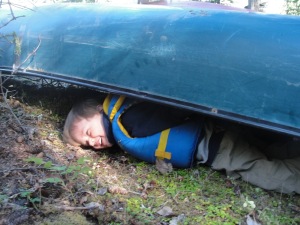 By day, we had hour-long “I Spy” games where black-and-white was a bald eagle, and brown-and-rusty was an old gold dredge. There was a special bucket full of collected rocks to throw randomly into the river, and long sticks for pretend fishing. And of course, we played hide-and-seek among the short black spruce and poplars, ever ready with the bear spray in our pocket in case a Grizzly joined our game.
By day, we had hour-long “I Spy” games where black-and-white was a bald eagle, and brown-and-rusty was an old gold dredge. There was a special bucket full of collected rocks to throw randomly into the river, and long sticks for pretend fishing. And of course, we played hide-and-seek among the short black spruce and poplars, ever ready with the bear spray in our pocket in case a Grizzly joined our game.
Some parenting-in-wilderness issues we had planned for – like bear encounters and kids falling overboard. But we hadn’t considered how to reign in rowdy kids on a one-way trip down a fast-moving river. “We’ll turn this canoe right around and go back,” elicits dismissive guffaws from even a preschooler (and an echo from his toddler brother). There’s no bedroom or couch for time-outs, and in our case, no toys to confiscate: in an epic oversight that’s the stuff of parenting nightmares, the carefully planned bag of books and dinky cars sat uselessly back home.
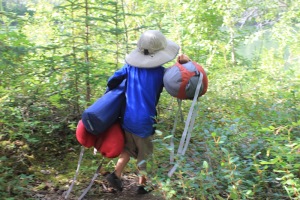 But where their father (the packer of the bags) messed up, our boys stepped up. They connected tent poles and drove in pegs, helped unravel sleeping bags and deflate air mattresses, collected kindling and dried the clean supper pots. They even learned to help put in, take out, and tie up the canoes, and to pump river water through a filter. Who needs The Backyardigans when you’re in a million-acre playground?
But where their father (the packer of the bags) messed up, our boys stepped up. They connected tent poles and drove in pegs, helped unravel sleeping bags and deflate air mattresses, collected kindling and dried the clean supper pots. They even learned to help put in, take out, and tie up the canoes, and to pump river water through a filter. Who needs The Backyardigans when you’re in a million-acre playground?
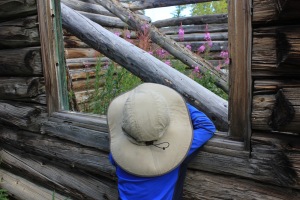 Yukon history was an inescapable, unexpected treat for kids and adults alike: the unintentional museum of abandoned artifacts that spans along the river’s banks is not restored with little made-up beds or bowls of plastic fruit, but left deserted for exploration at your own risk. Scant signage is enough to get the gist: a North West Mounted Police outpost, a wood yard serving the gold-rush sternwheelers’ insatiable appetite for fuel, a broken-down ship skeleton with the machinery removed but the massive rudder still operational, to the fascination of our two young boys.
Yukon history was an inescapable, unexpected treat for kids and adults alike: the unintentional museum of abandoned artifacts that spans along the river’s banks is not restored with little made-up beds or bowls of plastic fruit, but left deserted for exploration at your own risk. Scant signage is enough to get the gist: a North West Mounted Police outpost, a wood yard serving the gold-rush sternwheelers’ insatiable appetite for fuel, a broken-down ship skeleton with the machinery removed but the massive rudder still operational, to the fascination of our two young boys.
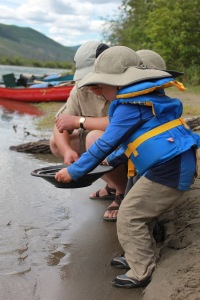 So while the hardcore European paddlers (and our boys) ate lunch in their canoes, we took advantage of the frequent fun stops for essential run-around time. When we couldn’t find a rotting old tool shed to investigate, we climbed up a hill burnt out by a recent forest fire and wandered around the soot-black stalks of former spruce, or set new lifetime records for rock-skipping with abundant flat stones on the smooth-flowing surface. While the boys collected more rocks in their canoe bucket, we dined on Brook’s dehydrated veggie pate, hummus and chocolate.
So while the hardcore European paddlers (and our boys) ate lunch in their canoes, we took advantage of the frequent fun stops for essential run-around time. When we couldn’t find a rotting old tool shed to investigate, we climbed up a hill burnt out by a recent forest fire and wandered around the soot-black stalks of former spruce, or set new lifetime records for rock-skipping with abundant flat stones on the smooth-flowing surface. While the boys collected more rocks in their canoe bucket, we dined on Brook’s dehydrated veggie pate, hummus and chocolate.
We came prepared, too: knowing that dedicated run-around time leads to healthy appetites, and suspecting our preschoolers may reject dehydrated meals, we pre-packed daily Ziploc bags with trail mix, dried fruit, and a super-supper combination of ReBars (8 servings of fruits and vegetables per bar) and protein-packed Clif Bars for dessert. They finished the snack bags before camp each day, even after a bowl of coconut-topped oatmeal for breakfast, and they devoured much more dehydrated supper than we expected.
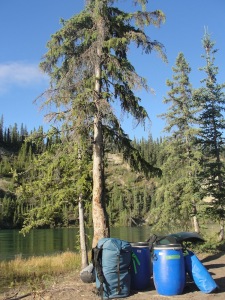 We packed light to accommodate all the food: one set of drenchable clothes and shoes for the canoe, and another warmer set for camp. Bug shirts proved useful as a novel play costume in addition to their listed purpose, and our own multi-pocketed, quick-dry khakis with removable legs served well to hold the bear spray, hand sanitizer, and large roll of Ziploc-enclosed toilet paper.
We packed light to accommodate all the food: one set of drenchable clothes and shoes for the canoe, and another warmer set for camp. Bug shirts proved useful as a novel play costume in addition to their listed purpose, and our own multi-pocketed, quick-dry khakis with removable legs served well to hold the bear spray, hand sanitizer, and large roll of Ziploc-enclosed toilet paper.
It didn’t rain until the last day, but it came down hard and cold. Thankfully, we had only two hours of paddling to Carmacks and a pack full of dry clothes to keep us warm.
Ten minutes in, however, it was clear that two-year-old Sitka was cold and scared. We wrestled over whether to pull over or push through, but Sitka’s blue lips and pleading cry made the decision. Within fifteen minutes our flotilla had docked, seats were shuffled, and he was cuddled on Mommy’s lap under a sleeping bag in the middle of one boat, with Uncle Malcolm at the helm and four-year-old Heron making his debut in the front seat.
The adults had absorbed Sitka’s misery, but before long we had absorbed Heron’s determination: big brother raised his game like we could have never dreamed, paddling his hardest for almost two hours in the driving rain.
What could have been an eternity seemed not so long, and we arrived on the shore at the Coal Mine Campground, home to an enclosed shelter, flush toilets and a renowned burger shack.
We all eventually stopped shivering once we assembled makeshift outfit of dry clothing and had a warm lunch. And just before we hopped into the car, pumped the heat until our faces started to burn, and shuttled the boys back to a warm bath in Whitehorse, Uncle Malcolm sheepishly popped the question.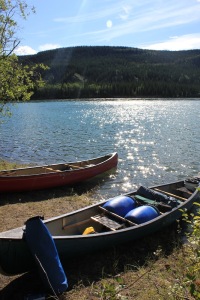
“What do you think about doing the second part to Dawson next summer?”
The chill returned to our bodies and we paused. The boys, however, still staring blankly ahead and shoveling french fries, exploded in unison “Yeah yeah yeah!”
And the planning began anew.
Ed Gillis is a writer and stay-at-home Dad – he lives in New Westminster with his two sons and wife (Terra Life founder Jocelyn Land-Murphy).






Good day! Do you use Twitter? I’d like to follow you if that would be okay. I’m absolutely enjoying your blog and look forward to new updates.
welcome to the site – glad you are enjoying it! you can follow us on @TerraLifeTweets